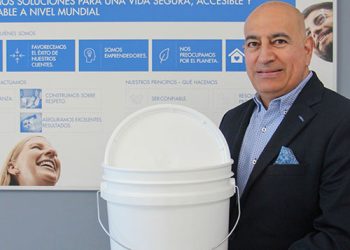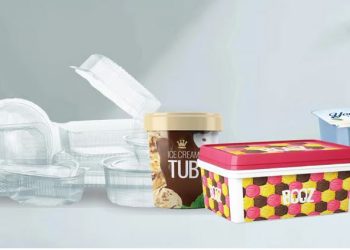ALPLA and NÖM are setting new benchmarks in environmentally friendly packaging for milk products.
While its competitors have opted for glass, the company NÖM has intentionally set its sights on plastic as its packaging material. The new NÖM milk bottle is made entirely of recycled PET (rPET) and is fully recyclable.
Niederösterreichische Molkerei (NÖM) has been addressing the issue of sustainability for many years. In 2008, the company implemented a comprehensive energy concept designed to continually reduce its carbon footprint. NÖM is now Austria’s first and, currently, only carbon-neutral dairy. It took another step that has a major impact on the environment in autumn 2019 with its introduction of a milk bottle made of 100 per cent rPET. ALPLA developed these bottles and produced them.
A carefully considered decision for the benefit of the environment
The unveiling of this packaging solution made of recycled PET may have come as something of a surprise to some industry experts as other Austrian dairies have recently reintroduced glass bottles for their fresh milk. This is often based on the belief that the consumers favour glass as a packaging material over plastic. But NÖM is not only interested in its image and in trends – it also focuses on water-tight facts regarding the environmental impacts of the various types of packaging material.
PET bottles with a high recyclate proportion have low environmental impacts
In an interview with an Austrian trade magazine,* Erik Hofstädter, NÖM’s head of Marketing and Sales, summarised the decision-making criteria as follows: ‘As a leading producer of milk products in bottles in Austria and throughout Europe, we are aware of the responsibility we bear and, as Austria’s only carbon-neutral dairy, we are focusing on packaging that leaves the smallest carbon footprint and which is good for the environment in the long term. The packaging life cycle assessment recently presented by c7-consult corroborates this objective, as it clearly indicates that PET bottles with a high recyclate proportion are well ahead of the single-use glass bottle in terms of their environmental footprint and are also comfortably ahead of reusable glass bottles’
It is in particular the water savings related to used bottle reprocessing, the lower weight of the PET bottles and the space savings during transportation that have a positive impact on the life cycle assessment of bottles made of 100 per cent rPET. The calculation that NÖM uses for the carbon savings during transportation is as follows: 600,000 milk bottle preforms can be transported per lorry load. But it would take 23 lorries to transport the same amount of glass bottles. For Erik Hofstädter, another advantage is the disposal of used PET milk bottles: ‘They can be disposed of in the yellow recyclables bin bags or bins, and this guarantees a simple and carbon-efficient means of disposal.’
Outstanding development achievements:
ALPLA produces the milk bottles made of 100 per cent rPET at the Steinabrückl site in Austria. Plant Manager Werner Rosenberger and his team can draw on a wealth of experience in bottle production involving high recyclate proportions and were able to take this project through to market maturity quickly in close consultation with the customer. ‘The quality requirements are obviously very high for packaging for fresh milk – food safety has to be guaranteed,’ explains Werner Rosenberger. ‘The bottles have to be tightly resealable, for example, in order to maintain the milk’s shelf life.’ The plant manager especially appreciates the high degree of mutual trust based on many years of collaboration between ALPLA and NÖM that serves as the basis for innovations. NÖM has been an ALPLA customer for 19 years.
Fit for the materials cycle
The partners pay particular attention to the high recyclability of packaging. Plant Manager Werner Rosenberger emphasises: ‘The milk bottle is made of rPET that’s as clear as glass because it is easily identifiable within the recycling stream and can therefore be reprocessed. Already at the packaging design stage, we ensure that we get the bottles back as recyclate and that they don’t end up being thermally recycled.’
Like all other types of used packaging, the empty bottles can simply be disposed of in the household recyclables collection (yellow bin bag or bin). It is important that the consumers remove the label in order to make the recycling process more efficient. In the recycling process, the bottles are initially turned into flakes and then into food-safe pellets, which are subsequently used to produce new packaging. NÖM supports consumer education measures and is therefore playing its part in the highest possible recycling rates being achieved. In addition, NÖM plans to further increase the proportion of recyclates used in its packaging. It is currently at 25 per cent of the dairy’s entire PET range, and the aim is to increase this to at least 50 per cent by 2020.
Source: ALPLA
Packaging 360 is a comprehensive knowledge sharing ecosystem for the Indian packaging industry. Our services include an online content platform to deliver news, insights and case studies; organising conferences seminars and customised training; Providing Bespoke Project Consulting, Market Research and Intelligence.







